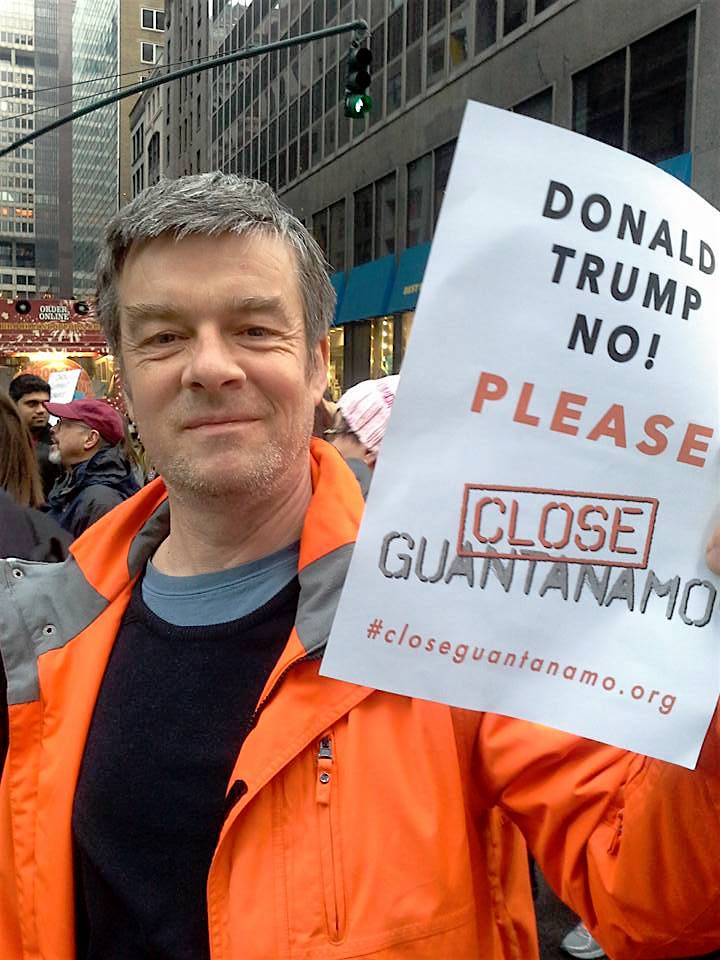As You Read This, Guantánamo Prisoner Ahmed Rabbani Has Been On A Hunger Strike for 2,846 Days

Please support my work as a reader-funded journalist! I’m currently trying to raise $2500 (£2000) to support my writing and campaigning on Guantánamo and related issues over the next three months. If you can help, please click on the button below to donate via PayPal.
With the media spotlight hopefully being shone anew on the prison at Guantánamo Bay, now that Joe Biden has been elected as the US president, it is to be hoped that, as I explained in my recent article, President Elect Biden, It’s Time to Close Guantánamo, arrangements will be made to release the five men still held who were unanimously approved for release by high-level government review processes under President Obama, and that there will be an acceptance within the Biden administration that holding 26 other men indefinitely without charge or trial is unacceptable.
These 26 men — accurately described as “forever prisoners” by the media — were recommended either or for prosecution, or for ongoing imprisonment without charge or trial, on the basis that they were “too dangerous to release,” even though it was acknowledged that insufficient evidence — or insufficient untainted evidence — existed for them to be charged, by the first of Obama’s two review processes, the Guantánamo Review Task Force, in 2009.
Four years later, the 26 — along with 38 others — were deemed eligible for a second review process, the Periodic Review Boards. Unlike the first process, which involved officials assessing whether prisoners should be freed, charged or held on an ongoing basis without charge or trial, the PRBs were a parole-type process, in which the men were encouraged to express contrition for the activities in which they were alleged to have been involved (whether those allegations were accurate or not), and to present credible proposals for a peaceful and constructive life if released.
Asadullah Haroon Gul: The Hunger Striking Afghan Forgotten at Guantánamo

Please support my work as a reader-funded journalist! I’m currently trying to raise $2500 (£2000) to support my writing and campaigning on Guantánamo and related issues over the next three months of the Trump administration. If you can help, please click on the button below to donate via PayPal.
Regular readers will recall the sad story of Asadullah Haroon Gul, one of the last two Afghans amongst the 40 men still held in the prison at Guantánamo Bay. In correspondence from Guantánamo this year, Gul has written about the coronavirus, about being a “no value detainee”, and about the murder by police of George Floyd and the resurgent Black Lives Matter movement.
As seems abundantly clear — to everyone except his captors — Gul, one of the last prisoners to arrive at Guantánamo, in June 2007, is a fundamentally insignificant prisoner whose ongoing imprisonment makes no sense. The US has quite nebulously alleged that he was involved with Hezb-e-Islami Gulbuddin (HIG), led by the warlord Gulbuddin Hekmatyar, who had supported Al-Qaeda at the time of the US-led invasion. However, as I explained in July, “Gul very clearly had no meaningful connection with HIG, his involvement extending only to having lived, with his wife and family, in a refugee camp that HIG ran, but, as in so many cases of mistaken identity at Guantánamo, the US authorities didn’t care.”
To add insult to injury, Hekmatyar’s status has now changed. He reached a peace agreement with the Afghan president, Ashraf Ghani, and at the start of this year a former Guantánamo prisoner with HIG associations, Hamidullah, was repatriated from the United Arab Emirates, where he had been sent with other Afghans in 2016, because of this agreement, surely undermining any efforts by the US to claim that Gul should still be held.
18 Years After 9/11, the Endless Injustice of Guantánamo is Driving Prisoners to Suicidal Despair

Please support my work as a reader-funded journalist! I’m currently trying to raise $2500 (£2000) to support my writing and campaigning on Guantánamo and related issues over the next three months of the Trump administration. If you can help, please click on the button below to donate via PayPal.
I wrote the following article for the “Close Guantánamo” website, which I established in January 2012, on the 10th anniversary of the opening of Guantánamo, with the US attorney Tom Wilner. Please join us — just an email address is required to be counted amongst those opposed to the ongoing existence of Guantánamo, and to receive updates of our activities by email.
18 years ago, on September 11, 2001, the world changed irrevocably, when terrorists, using hijacked passenger planes, attacked the US mainland, killing nearly 3,000 people. In response, the administration of George W. Bush launched a brutal, global “war on terror,” invading Afghanistan to destroy Al-Qaeda and to topple the Taliban government, and embarking on a program of kidnapping (“extraordinary rendition”), torture and the indefinite detention without charge or trial of alleged “terror suspects.”
18 years later, the war in AfghanIstan drags on, the battle for “hearts and minds” having long been lost, a second occupied country — Iraq — illegally invaded on the basis of lies, and of false evidence obtained through torture, remains broken, having subsequently served as an incubator for Al-Qaeda’s savage offshoot, Daesh (or Islamic State), and the program of indefinite detention without charge or trial continues in the prison established four months after the 9/11 attacks, at Guantánamo Bay on the US naval base in Cuba.
Torture, we are told, is no longer US policy and the CIA no longer runs “black sites” — although torture remains permissible in Appendix M of the Army Field Manual, and no one can quite be sure what the US gets up to in its many covert actions around the world.
“The World Has Forgotten Me” Says Ahmed Rabbani, 95-Pound Hunger Striker in Guantánamo
 Please support my work as a reader-funded journalist! I’m currently trying to raise $2500 (£2000) to support my writing and campaigning on Guantánamo and related issues over the next three months of the Trump administration.
Please support my work as a reader-funded journalist! I’m currently trying to raise $2500 (£2000) to support my writing and campaigning on Guantánamo and related issues over the next three months of the Trump administration.
Over 16 and a half years since the ill-conceived prison at Guantánamo Bay opened, and over two and a half years into the presidency of Donald Trump, the terrible injustice of Guantánamo has, sadly, largely slipped off the radar.
The reasons are many — and none reflect well on the US, its institutions and its people. The American people have never cared sufficiently about what is being done in their name at Guantánamo, where the fundamental right not to be imprisoned without due process has been done away with since the prison opened, a product of the country’s all-consuming vengeance after the terrorist attacks of September 11, 2001. Few people, it seems, either know or care that very few people accused of terrorism have actually been held at Guantánamo, and that most of those held were foot soldiers in an inter-Muslim civil war in Afghanistan, or civilians swept up in incompetent dragnets, and that the majority — whether soldiers or civilians — were not “captured on the battlefield,” but were sold to the US by their Afghan and Pakistani allies.
When it comes to America’s institutions, everyone has failed to live up to their responsibilities — President Obama, for example, who took eight years to fail to close the prison, despite promising to do so on his second day in office; Congress, where lawmakers generally take little interest in anything other than appeasing big business; and the courts, who have failed to fundamentally challenge the lawlessness of Guantánamo. Read the rest of this entry »
Ten Years After His Release From Guantánamo, Sami al-Hajj Publishes His Compelling Memoir, ‘Prisoner 345,’ Free Via Al-Jazeera
 Please support my work as a reader-funded journalist! I’m currently trying to raise $2500 (£2000) to support my writing and campaigning on Guantánamo and related issues over the next three months of the Trump administration.
Please support my work as a reader-funded journalist! I’m currently trying to raise $2500 (£2000) to support my writing and campaigning on Guantánamo and related issues over the next three months of the Trump administration.
Just over ten years ago, on May 1, 2008, one of the better-known prisoners at Guantánamo, the Al-Jazeera cameraman Sami al-Hajj (aka al-Haj), was freed from the prison and repatriated to his home country of Sudan. I meant to mark the occasion with an article, but, at the time, I was caught up in issues involving my campaigning for social housing in the UK, and the local government elections that took place on May 3.
Now, however, belatedly, I’m getting round to it, as I want to promote ‘Prisoner 345: My Six Years in Guantánamo,’ Sami’s powerful and emotional account of his capture and imprisonment, which is available for free as a PDF via Al-Jazeera.
Sami’s story was of particular interest during his imprisonment because he was working for Al-Jazeera as a journalist and cameraman at the time of his capture, and his captors quite shamelessly tried to get him to work for them instead — as well as very publicly threatening the Qatar-based channel by imprisoning, without charge or trial, one of their journalists. Read the rest of this entry »
Guantánamo Hunger Striker Khalid Qassim Says, “We Are Like Lab Rats,” Says Doctor Told Him, “If You Lose Organs, It Is Your Choice”
 Please support my work as a reader-funded journalist! I’m currently trying to raise $2500 (£2000) to support my writing and campaigning on Guantánamo and related issues over the next three months of the Trump administration.
Please support my work as a reader-funded journalist! I’m currently trying to raise $2500 (£2000) to support my writing and campaigning on Guantánamo and related issues over the next three months of the Trump administration.
Last Thursday, as I travelled across London to show solidarity with the victims of a recent injustice in the UK — the Grenfell Tower fire in June, in which 71 people died needlessly because safety standards had been so gravely eroded by those responsible for residents’ safety — the victim of another injustice, not adequately dealt with for 16 years, had an article published in the Guardian.
That victim of injustice is Khalid Qassim (aka Qasim), a Yemeni prisoner at Guantánamo, held for almost 16 years without charge or trial. That would be unacceptable if he were a prisoner of war, as it is longer than the absurdly long Vietnam War, and it is insulting to claim that any war can last forever. However, Qassim and all the men held at Guantánamo since January 2002 have never been held as prisoners of war under the Geneva Conventions, who can be held unmolested until the end of hostilities.
Instead, they are, essentially, the same prisoners without any rights whatsoever that the Bush administration first defined them as back in January 2002. Just ten of the 41 men still held are facing or have faced trials (in the military commission trial system that, in any case, is not fit for purpose), while the rest are still largely invisible, never tried, never charged, and unable to be freed except at the whim of the president. Read the rest of this entry »
Guantánamo’s Oldest Prisoner Calls Conditions “Hell,” Says, “We Are Getting Collective Punishment Because of the Hunger Strike”
 Please support my work as a reader-funded journalist! I’m currently trying to raise $2500 (£2000) to support my writing and campaigning on Guantánamo and related issues over the next three months of the Trump administration.
Please support my work as a reader-funded journalist! I’m currently trying to raise $2500 (£2000) to support my writing and campaigning on Guantánamo and related issues over the next three months of the Trump administration.
The horrors of Guantánamo — ever present in a prison where men have been held for nearly 16 years without ever being charged with a crime, and with no notion of when, if ever, they will get to leave — seem to be being ramped up under Donald Trump, as we might have suspected from his aggressive stance towards the prison and the men held there, even before he took office in January, and from witnessing his racism, and glimpsing the violence that permanently seems to lurk beneath his blubbery exterior.
Despite threats to send new prisoners to Guantánamo — threats which have not, mercifully, transpired — Trump did nothing in his first eight months regarding the prison except shutting the door on it and refusing to contemplate releasing anyone, even the five men — out of the 41 still held — who were approved for release by high-level government review processes under President Obama.
Two months ago, however, according to hunger striking prisoners, whose story I reported before the mainstream media took an interest, Trump finally made his influence felt, changing the rules about the way they are treated. For over ten years, hunger striking prisoners were closely monitored, but now, according to those refusing food, new instructions, initiated from September 20 onwards, mean that they are no longer having their health assessed at all. Read the rest of this entry »
300 Days of Trump: Join Our Photo Campaign Calling for the Closure of Guantánamo
 Please support my work as a reader-funded journalist! I’m currently trying to raise $2500 (£2000) to support my writing and campaigning on Guantánamo and related issues over the next three months of the Trump administration.
Please support my work as a reader-funded journalist! I’m currently trying to raise $2500 (£2000) to support my writing and campaigning on Guantánamo and related issues over the next three months of the Trump administration.
I wrote the following article for the “Close Guantánamo” website, which I established in January 2012, on the 10th anniversary of the opening of Guantánamo, with the US attorney Tom Wilner. Please join us — just an email address is required to be counted amongst those opposed to the ongoing existence of Guantánamo, and to receive updates of our activities by email.
What a disappointment Donald Trump is — something that many of us suspected when he was elected as the 45th President of the United States over a year ago, but that does not become any easier to bear with the passage of time.
Largely governing by tweet, Trump has nothing positive to show for his first 300 days in office (yesterday, Nov. 16), as he alienates allies and does nothing to improve the lives of ordinary Americans. His Muslim ban, which he still persists in trying to enforce, remains shockingly racist, xenophobic and Islamophobic, and it is clear that he also extends these prejudices to the men held at Guantánamo.
Uninterested in any nuances regarding Guantánamo — the fact that indefinite detention without charge or trial ought to be fundamentally un-American, for example, or that there are men held at the prison who have been approved for release — Trump has always behaved as though the prison contained “the worst of the worst,” turning the clock back to the terrible hyperbole of Guantánamo’s early days under George W. Bush. Read the rest of this entry »
My New Article for Al Jazeera English: The Struggle to Stop the Trump Administration’s Potentially Deadly Neglect of Guantánamo Hunger Strikers
 I’m delighted to report that Al Jazeera English have just published an article I wrote for them, Guantánamo detainee: US changed force-feeding policy, which I hope you have time to read, and will share if you find it informative.
I’m delighted to report that Al Jazeera English have just published an article I wrote for them, Guantánamo detainee: US changed force-feeding policy, which I hope you have time to read, and will share if you find it informative.
The article came out of the shocking news announced by the human rights organization Reprieve six weeks ago, when they reported that they had been told that the authorities at Guantánamo were no longer force-feeding long-term hunger strikers, as had been happening for ten years — an announcement that I wrote about at the time in an article entitled, Trump’s Disturbing New Guantánamo Policy: Allowing Hunger Strikers to Starve to Death.
Force-feeding is akin to torture, as medical experts have long established, but, as I have been mentioning since this story broke, it surely cannot be acceptable for men who have been held for up to 16 years without ever being charged or tried to be allowed to starve to death, and there should, therefore, be another response, one sought by the prisoners themselves, who are asking either to be charged or released, a not unreasonable request after so long. Read the rest of this entry »
Former Guantánamo Prisoner Lakhdar Boumediene Condemns “Cruel, Sadistic” New Policy of Allowing Hunger Strikers to Starve
 Please support my work as a reader-funded journalist! I’m currently trying to raise $2500 (£2000) to support my writing and campaigning on Guantánamo and related issues over the next three months of the Trump administration.
Please support my work as a reader-funded journalist! I’m currently trying to raise $2500 (£2000) to support my writing and campaigning on Guantánamo and related issues over the next three months of the Trump administration.
It’s nearly a month since Guantánamo thrust its way back into the public consciousness with news from the human rights organization Reprieve that, under a new chief medical officer at Guantánamo, the rules for treating long-term hunger strikers had changed. Where, previously, those going without food were force-fed when they lost a fifth of their body weight, two hunger strikers — Ahmed Rabbani and Khalid Qassim, clients of Reprieve — indicated that, since the new appointment, on September 20, they were no longer being force-fed, and were not even being monitored.
Following further phone discussions with their clients, Reprieve suggested that what was happening was that prisoners were being left to suffer whatever damage might ensue from prolonged starving, but the medical authorities were still intending to force-feed them if it looked like they might die.
Force-feeding is a horrible process, of course, akin to torture, but although medical experts insist that mentally competent prisoners must be allowed to starve themselves to death, if they wish, that does not strike me as relevant at Guantánamo, where the men on hunger strike have never been tried or convicted of any crime, and allowing them to die would actually endorse the very reason they are hunger striking in the first place — because they are being held without charge or trial, with no end in sight to their preposterously long ordeal, and they have no other way of protesting about the injustice of their predicament. Read the rest of this entry »












 Who's still at Guantánamo?
Who's still at Guantánamo?
